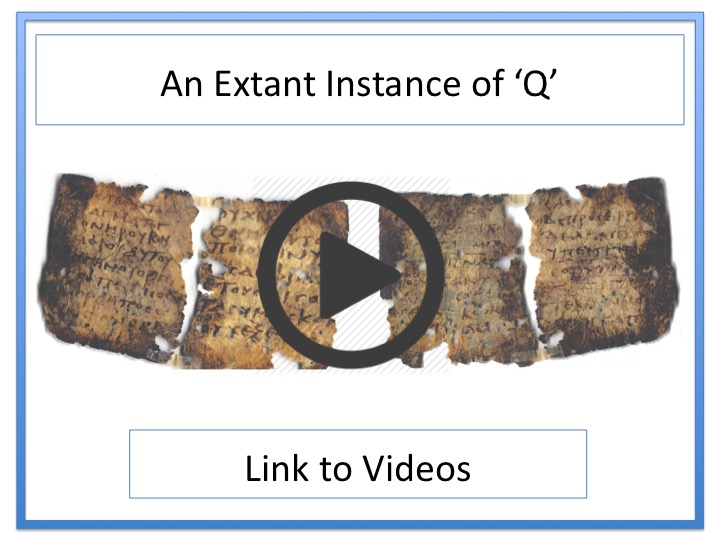| Alan Garrow Didache |
Streeter's 'Other' Synoptic Solution:
|
"Brilliant videos! ... your arguments are compelling" Richard Bauckham |
|
Video 1/5: The Streeter less travelled [11 minutes]
This presentation revisits BH Streeter's influential reasons for supposing that Luke did not use Matthew, and vice versa - thus requiring the existence of Q. It observes that Streeter made two logical mistakes, often repeated in subsequent discussion. When these errors are corrected, however, Streeter's 'other' solution emerges: the Matthew Conflator Hypothesis (MCH). |
|
|
Video 2/5: This presentation is a car crash [10 minutes]
This presentation begins by noting that a good Synoptic hypothesis is like a good multi-vehicle accident reconstruction - all the individual pieces of data need to be accounted for within a single overarching story in which each participant behaves believably and consistently. Three pieces of data are examined: High Agreement passages, Low Agreement passages and Alternating Primitivity. |
|
|
Video 3/5: Scrolls are so 'last century' [10 minutes]
This presentation looks at a fourth piece of data: the physical mechanics of creating texts in the first and second centuries. It notes that Luke and Matthew employ very different techniques in their handling of Mark. Thus, Luke acts as a conventional scroll user, while Matthew seems to employ the new technology of the codex. It goes on to consider which hypothesis allows each writer to behave consistently in the treatment of their sources. |
|
|
Video 4/5: Turning over/overturning data [14 minutes]
This presentation takes a fresh approach to three further elements of data: Matthew and Luke 'never' agree in their placement of the Double Tradition; Overlapping versions of the same event are commonly conflated by Matthew; Matthew and Luke sometimes agree in minor ways against Mark. It also considers patterns in Matthew's omissions from Luke. |
|
|
Video 5/5: A seamless reconstruction [7 minutes]
This presentation takes the eight pieces of data considered above and, as with an accident reconstruction, seeks to incorporate them within a single overarching story in which each participant behaves believably and consistently. |
|
|
Follow this link to the next set of videos
An Extant Instance of 'Q' |
Further Reading and Videos
The Matthew Conflator Hypothesis falls within the group of solutions now generally known as the Matthean Posteriority Hypothesis (MPH). Further relevant pages on this site are 'MPH Origin Stories' and 'Conference Papers'..
The first article in the current wave interest in Matthew's use of Luke was:
Ronald V Huggins, 'Matthean Posteriority: A Preliminary Proposal' NovT, 1992
You can read its back-story here.
A popular-style book, which developed original lines of argument, was:
Evan Powell, The Myth of the Lost Gospel, (Symposium, 2006)
You can read the back-story to this book here.
The first readable, scholarly, book-length investigation of the case for Matthew's use of Luke was:
Robert K MacEwen, Matthean Posteriority, (LNTS, London: T&T Clark Bloomsbury, 2015)
You can read the back-story to this book here:
The first peer review article to give substantial attention to attempting to rebut the MCH is:
Gerald F Downing, 'Plausibility, Probability and Synoptic Hypotheses' ETL, 2017
See also my response:
Alan Garrow, 'Plausibility, Probability and Synoptic Hypotheses: A Response to Gerald F Downing' ETL, March 2020
A pair of essays published in 2023:
Alan Garrow, 'Gnats, Camels and Matthew's use of Luke' (JSNT)
Alan Garrow, ''Frame and Fill' and Matthew's use of Luke' (Loyola University Conference volume, Peeters)
A good way to keep up to date with the latest developments in the Synoptic Problem is to join the Facebook Synoptic Problem Study Group.
The Matthew Conflator Hypothesis falls within the group of solutions now generally known as the Matthean Posteriority Hypothesis (MPH). Further relevant pages on this site are 'MPH Origin Stories' and 'Conference Papers'..
The first article in the current wave interest in Matthew's use of Luke was:
Ronald V Huggins, 'Matthean Posteriority: A Preliminary Proposal' NovT, 1992
You can read its back-story here.
A popular-style book, which developed original lines of argument, was:
Evan Powell, The Myth of the Lost Gospel, (Symposium, 2006)
You can read the back-story to this book here.
The first readable, scholarly, book-length investigation of the case for Matthew's use of Luke was:
Robert K MacEwen, Matthean Posteriority, (LNTS, London: T&T Clark Bloomsbury, 2015)
You can read the back-story to this book here:
The first peer review article to give substantial attention to attempting to rebut the MCH is:
Gerald F Downing, 'Plausibility, Probability and Synoptic Hypotheses' ETL, 2017
See also my response:
Alan Garrow, 'Plausibility, Probability and Synoptic Hypotheses: A Response to Gerald F Downing' ETL, March 2020
A pair of essays published in 2023:
Alan Garrow, 'Gnats, Camels and Matthew's use of Luke' (JSNT)
Alan Garrow, ''Frame and Fill' and Matthew's use of Luke' (Loyola University Conference volume, Peeters)
A good way to keep up to date with the latest developments in the Synoptic Problem is to join the Facebook Synoptic Problem Study Group.
